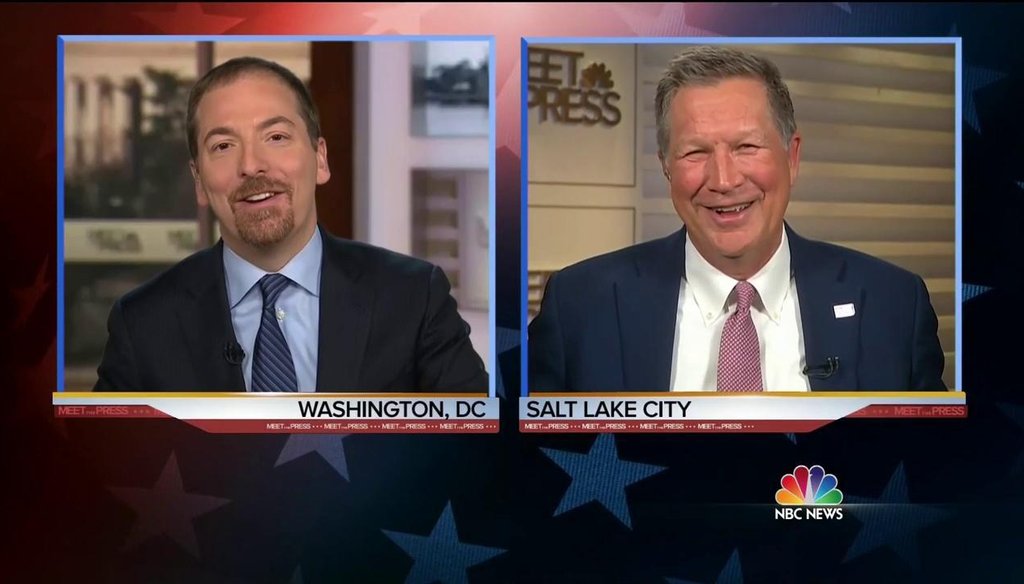Stand up for the facts!
Our only agenda is to publish the truth so you can be an informed participant in democracy.
We need your help.
I would like to contribute

Ohio Gov. John Kasich and NBC "Meet the Press" moderator Chuck Todd discuss Donald Trump and the 2016 Republican convention in the March 20, 2016, show. (Photo by NBC News)
Polar-opposite Senate leaders Mitch McConnell, R-Ky., and Harry Reid, D-Nev., kept wrangling over the stalled Supreme Court nomination of Merrick Garland on Sunday.
McConnell, the Senate majority leader, said the Senate will not hold hearings for President Barack Obama’s third Supreme Court nominee even after the November election, which NBC Meet the Press host Chuck Todd said conflicts with McConnell’s past criticism of Democratic resistance to nominees from GOP presidents.
The hypocrisy goes both ways depending on the political affiliation of the White House, Todd said. He questioned Reid, who in 2005 said the Constitution doesn’t require the Senate to give nominees a vote, about his own inconsistent history.
"You have to look at what has happened," Reid replied. "We have never held up a Supreme Court nomination. Since 1900 in a lame-duck session, there have been six that have all been approved."
In recent history, Democrats have at least allowed consideration of each Republican president’s nominee for the Supreme Court, even when they opposed the nominee. But Reid steps a little too far in saying Democrats "have never held up" a nomination.
His claim rates Mostly True.
Since the 1960s, the Senate has held a hearing for nearly every Supreme Court nominee, the exception being Harriet Miers, a 2005 George W. Bush nominee who faced opposition from Democrats and Republicans alike and withdrew from consideration.
So when McConnell vowed, within hours of Justice Antonin Scalia’s death, not to even consider the yet-to-be-named replacement, it was an unprecedented degree of opposition. (And, no, there’s no tradition of not nominating a justice during a presidential election year.)
It’s generally accepted, though, that the modern political battle over Supreme Court seats started with Democratic opposition to Robert Bork, a Ronald Reagan nominee, in 1988. Democrats launched a massive public assault on Bork’s conservative judicial philosophy and record.
Bork did get a hearing and a Senate vote, which he lost, but his confirmation process made the rules of the game more contentious.
"The rules have been changed for the battle over this particular seat on the court," an internal Reagan administration memo read, according to Roll Call. "Maybe they have been changed for all time."
More recently, several Senate Democrats — including Reid and then-Sen. Obama — attempted a filibuster against conservative Bush nominee Samuel Alito. The filibuster, though, was largely symbolic, as not enough senators participated to actually delay or block the vote, which resulted in Alito’s confirmation
Trump’s media air lift
Ohio Gov. John Kasich told Todd he doesn’t plan to drop his presidential bid before the July convention, especially now that his message is starting to pierce Trump-saturated TV coverage.
"Guess what? In the grassroots, people are getting it," Kasich told Todd. "Now, they didn't get it because, frankly you put me on the tube a lot, but Trump got, you know, $1.8 billion worth of free media. I got, like, none. Okay?"
Sadly for Kasich’s campaign, his statement about strikingly disproportionate free airtime rates Mostly True.
"I have never seen a candidate get as much earned media/free media as Trump. It isn't even close," political analyst Stuart Rothenberg said in an email. "I have been stunned at the amount of time Trump receives. They do telephone interviews. They cover entire speeches. He seems to be everywhere. It is very unusual."
Kasich’s campaign confirmed to PolitiFact that Kasich was referring to analysis by mediaQuant, a Portland, Ore.,- based media firm that in part tracks political coverage. The metrics were highlighted in a Tuesday story by the New York Times that pointed out mediaQuant said Trump topped all presidential candidates with $1.898 billion worth of "earned media" coverage over the last 12 months.
Earned media is coverage that candidates don’t have to pay for, such as newspaper and magazine stories, social media posts, and TV broadcasts. That’s different than paid media, which are mostly those campaign ads that blanket markets in an attempt to sway voters, and cost campaigns or super PACS or special interest groups.
MediaQuant tracks these mentions and then assigns a dollar value to them depending on the outlet and the quality of the coverage. That includes weighing whether coverage was positive, negative or neutral. Trump scored about 79 percent positive coverage, which is a big difference than, say, Florida Sen. Marco Rubio’s 40 percent positive coverage.
We checked mediaQuant’s figures for ourselves and found the billionaire does lead other candidates on every measured type of coverage, including more than $436 million worth of coverage in February alone.
Kasich has not suffered from literally no coverage, but it’s close to nothing by comparison. In the same measurements, mediaQuant said Kasich has received about $37.7 million in coverage over the last year. As the GOP field has winnowed, he’s moved up from 14th on mediaQuant’s coverage rankings in January to eighth in February. (On the Democratic side, mediaQuant said Hillary Clinton has gotten $746 million in earned media, while challenger Bernie Sanders got $321 million.)
These figures contrast heavily to the paid coverage both Trump and Kasich have bought. The two candidates have spent $10 million and $14 million, respectively, over roughly the same time frame, the Times noted.
Our Sources
See fact-checks.















































